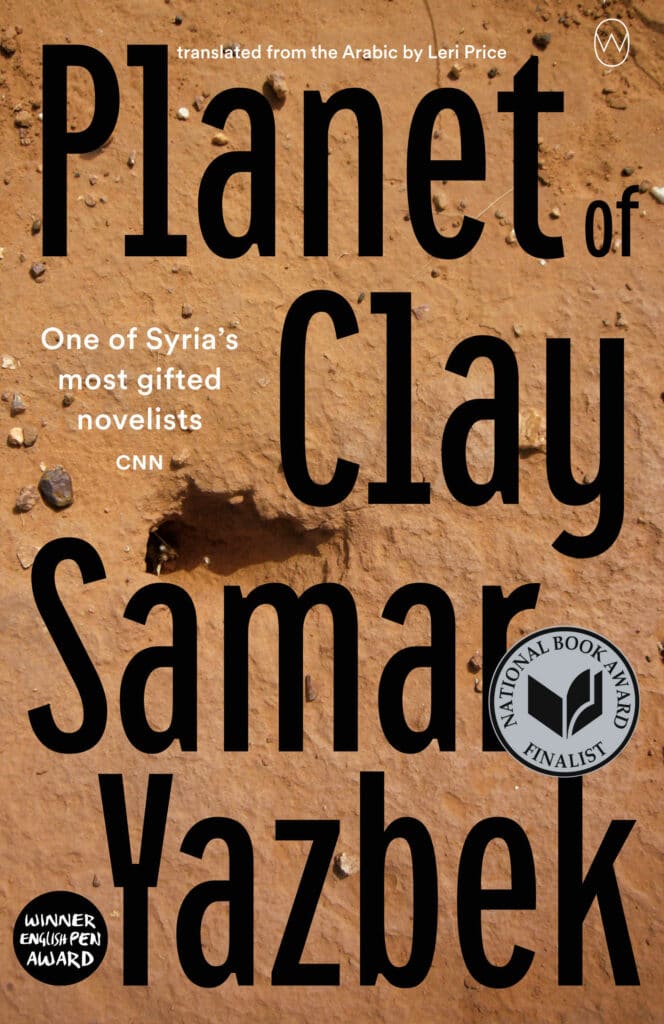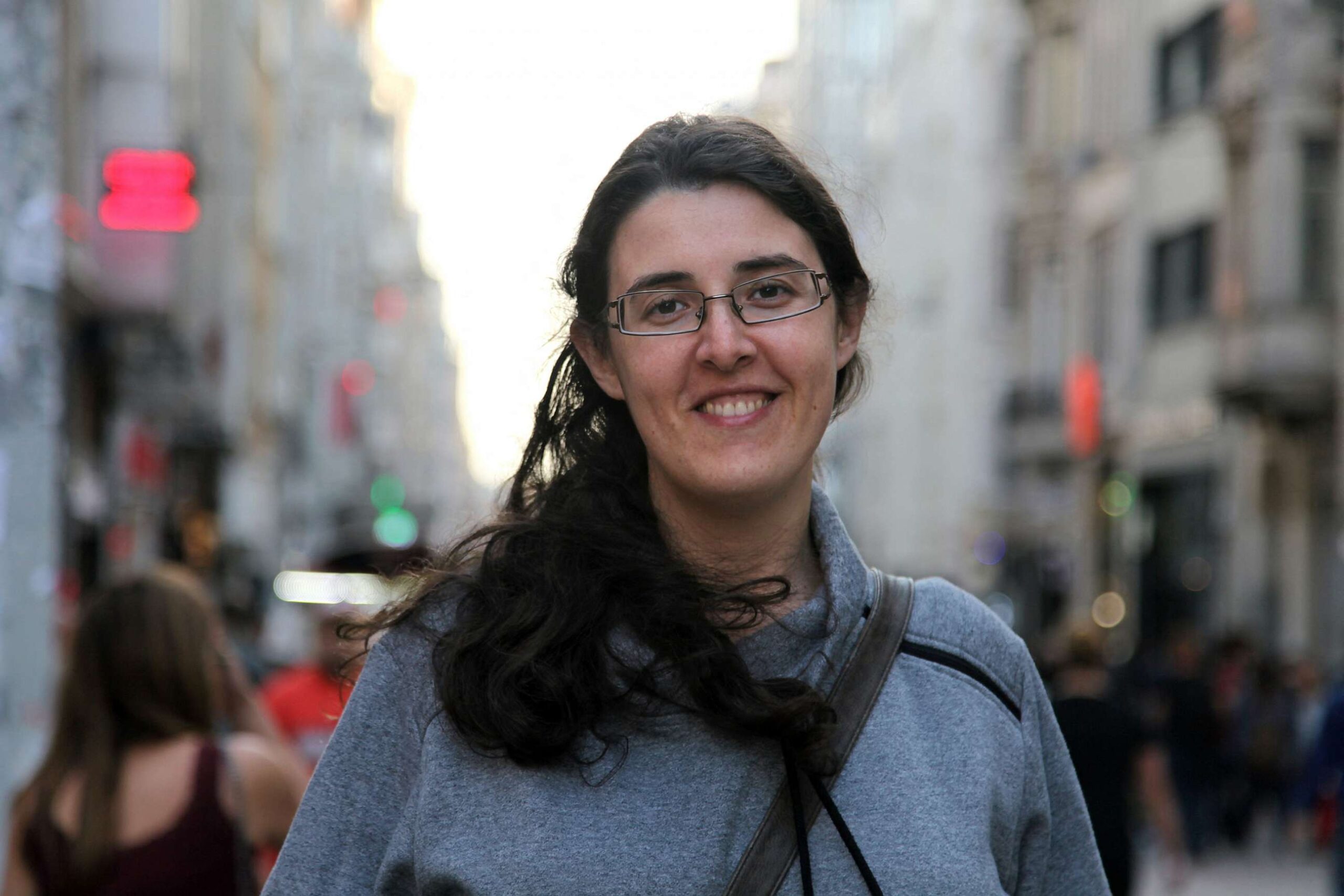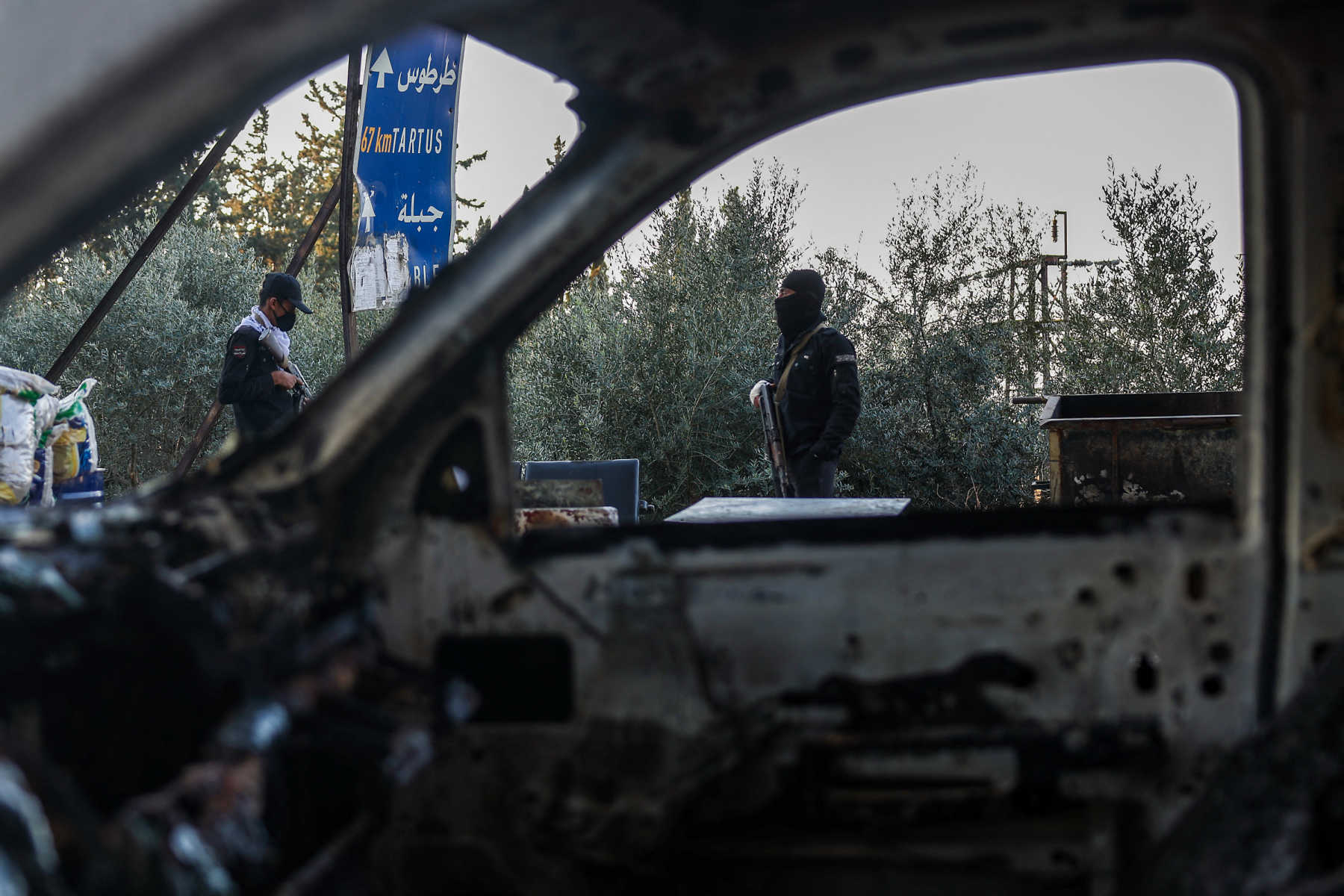Frederick Deknatel is the Executive Editor of Democracy in Exile, the DAWN journal.
عربي
Soon after Syria's uprising began, Samar Yazbek knew where she stood: with her fellow citizens braving bullets to protest Bashar al-Assad's regime and decades of his family's dictatorship. A successful novelist, screenwriter and journalist in Damascus, Yazbek had a public platform, including in the pan-Arab daily al-Quds al-Arabi, and she used it to document the early days of the peaceful demonstrations against Assad and how they were violently suppressed by his regime—directly contradicting its own propaganda about "terrorists" and foreign agitators. Her outspoken support for the protests meant she was cast out of her own community. Yazbek is from a prominent Alawite family in Jableh, on Syria's Mediterranean coast—the Assads' traditional heartland. "Dear traitor," a childhood friend texted her that spring of 2011, "even God's with the president and you're still lost."
That text message was included in the first nonfiction book Yazbek wrote about Syria's descent into civil war, published in 2012: A Woman in the Crossfire: Diaries of the Syrian Revolution. It covers the first 100 days of the uprising, when Yazbek herself was detained several times by Syria's secret police and beaten. At a security office in Damascus, she was threatened (along with her daughter), called "a black mark upon all Alawites" and pressured into going on state television to read a prepared script in which she would publicly back the regime. Yazbek, of course, refused. "From now on, you're aligned with the enemy," a menacing security officer told her. As Yazbek writes, she replied, "I'm not aligned with anyone. I'm aligned with the truth."
Right after that exchange, Yazbek was dragged through an underground prison in the basement of that Damascus security office. "Just a short trip," the officer said, "so you'll write better." She saw detainees lying beaten on the floor and hung up in chains.
The regime's intimidation failed to silence her, but Yazbek soon fled with her daughter for France. She returned to Syria, though, sneaking back into the north of the country across the Turkish border three times in 2012 and 2013, to witness and document firsthand what she described as the civil war's "morbid theater of blood." Those trips became another book, The Crossing: My Journey to the Shattered Heart of Syria, which combined the urgent testimonials of A Woman in the Crossfire with arresting war reporting that proved remarkably prescient, as Islamist extremists took over the battlefield in northern Syria.
"An authoritarian power of a different kind had entered the scene and was starting to form a serious obstacle to any civil activism or any attempt to rebuild the shattered society," she wrote—the Islamic State most of all. "Peaceful activists were being tortured, killed and exiled at the same time as these fundamentalist Islamists were being released" from regime jails, in what she called "an orderly, well-planned operation to divide up the liberated north as spoils among jihadist incomers."
The Crossing went on to win the Best Foreign Book award in France and was translated into 17 languages. Yazbek had received the PEN Pinter International Writer of Courage Award in 2012 for A Woman in the Crossfire, among other honors. In 2012, she also founded Women Now for Development, an NGO based in France that works to empower Syrian women, economically and socially, and to support women's and children's education in the country.

Yet Yazbek considers herself a novelist above all else—her novels include Cinnamon, which was also published in English in 2012—and this year she returned to fiction with Planet of Clay, a surreal account of Syria's war told through the eyes of a young girl, Rima, whose mother is killed in an attack at a Damascus checkpoint. After Rima recovers in a military hospital, her brother—who has become a rebel fighter—takes her to the besieged Ghouta suburbs, where she spends her days hiding out in a cellar, lost in her own imagination. She writes down her own haunting, disjointed story, inflected with both the Quran and The Little Prince, while the war rages outside.
Rima is the novel's narrator, and her innocence and apparent lack of understanding of what is happening around her only underscores the senselessness of the war's horrors—especially the aftermath of the Assad regime's devastating 2013 chemical attack on Ghouta, which Rima survives. "The smells were disgusting, and that is when I learned the planes and the sky rained smells in August."
Earlier this month, Planet of Clay, which was translated from the Arabic by Leri Price, was named a finalist for the 2021 National Book Award for translated literature. Yazbek spoke to Democracy in Exile from France after the National Book Award finalists were announced. She discussed writing from exile, how Syrians abroad—"the Syria outside"—can work with "the Syria inside," and why "it feels more like I'm living in Syria than I'm living in France." Yazbek spoke primarily in Arabic, with translation assistance provided by RAYA Agency.
The following transcript has been edited lightly for clarity and length.
Your first two books about Syria's revolution were nonfiction. Why did you decide to return to fiction now?
I didn't decide to write a novel. I'm originally a novelist and have been writing novels for 20 years. So, this is why it was a novel. Writing nonfiction actually was more like an exile from my true self, because I've always written novels about these questions related to human rights and Syria. If I may just introduce my multiple identities: I have several personas, we could say, due to my different activities. But my true self is that I am a novelist, first and foremost.
When you had to go into exile in 2011 and leave Syria, did you feel that you couldn't be a novelist for a while, because you were in exile yourself?
It was part of my main problem, that for four years I couldn't write a novel. I was exiled both from my land and from my true self—from my identity as a novelist. That's why, when I started writing this novel, it was like getting back to my true land.
"For four years I couldn't write a novel. I was exiled both from my land and from my true self—from my identity as a novelist. That's why, when I started writing this novel, it was like getting back to my true land."
- Samar Yazbek
Why did you decide to write Planet of Clay from the perspective of a young girl? Do you think that there are certain things that a reader can understand about Syria from Rima's eyes?
In fact, I was always interested in the voices of women and their rights, which is part of one of my multiple identities that I mentioned. So, most characters in my novels are always women. I'm not just interested in their voices in literature, but also in their work on the ground. And that's really an important part of my work as the founder of an NGO dedicated to empowering women.
I would like to say that Rima's story is more than the story of the war. There are several layers there, and she's a complex character. It may appear at first sight like a girl telling a story of the war, but there's more to it. She tells about the power of imagination to combat the inferno of war and violence. She tells a story of the multiple faces of the monsters that women have had to face in the region—not just in Syria—from traditionalists to Islamists to political authorities, and everyone in between.
At the same time, she documents this massacre—which is actually the chemical attacks that happened in Ghouta—without her touching the violence itself, which was a challenge from a writing perspective. After writing all these nonfiction narratives about all the violence of the war, writing this novel is one of the best things that happened to me.
Why was that? Because it was returning to your work as a novelist?
Because I returned to myself. I lost myself because I stopped writing as a novelist. It was my reality. I felt it was my duty as an intellectual and as a writer to write the truth of what had happened in Syria. The victims needed to have this voice. This was very painful, because I had to be on the frontline and I had to listen to all of these stories of death and violence and rape, so it was, psychologically, extremely hard to be immersed in this. I needed to get back to art and literature. I felt like I was about to lose this capacity, and this was like death to me, in a way.
Do you think there are things that a novel can do to explain or show the horrors in Syria more than nonfiction?
I think both can fulfill the same purpose, but in different ways. It's also complicated because as a book written by an Arab, the way it is received—and the way we are received—are by default as a political object. So even if it's literature, we're not necessarily treated as novelists, or the book is not treated as a novel, like it would be from other languages and countries. Because the book is a political object, the literary or artistic value of it is kind of overlooked in the Western press. My problem as a writer is that the focus is on the political or the social aspect of my books, but rarely do people spend time on the writing technique or aesthetic form in itself.
In Planet of Clay, much of the story takes place in a cellar in Ghouta. It's a place that so much of the world seems to have forgotten about—the suffering of civilians in Ghouta, and in other parts of Syria. Why do you think that the world has forgotten about them?
The first point, I think, is what we call in the West realpolitik—and that is the idea that Assad needs to stay. I'm afraid I'll have to get into a political speech because your question is political. The Syrian situation is complex for various reasons, and I'll try to summarize. There's a competition between international interests from various states. Syria is currently occupied by Iran, Russia, the Turks, America. There are many armies, in the full sense, on the ground in Syria presently, and they don't agree with each other. The truth is that Assad's agenda, and the violence he used, basically led to the appearance of Daesh [ISIS, or the Islamic State], and this considerably reduced the empathy of the West for the Syrian people. When Daesh appeared, people kind of lost their empathy for the Syrian people, and that was Assad's strategy. I explain in my books how Assad the father and Assad the son fed Islamic extremism—and this is also true in Iraq.
One other problem is that the voice of the official opposition to Assad was essentially not good enough. It was associated in many ways with Turkey, which is in fact one of the occupying parties.
Most importantly, the world has forgotten that Bashar al-Assad was a criminal of war, and still is. Syria now, in appearance, is a country, but in fact it is more like fragments that are ruled by different militias.
"The Syrian cause will be, for a while, one of the bigger burdens on humanity's conscience—that they let a criminal of war kill and destroy his own people and his own country."
- Samar Yazbek
You haven't returned to Syria since 2013, right?
Yes.
Do you have any hope of returning in the future?
All the time. All the time. I need to come back, but I'm hopeless, really, right now. But one day, I hope. I have a lot of projects in my head to do in Syria, and we're still working in Syria with women [through the Women Now NGO], and I'm still working with a lot of groups inside Syria.
Do you have any hope for Syria? Even acknowledging everything you said, do you think that anything will change?
I believe that the Syrian cause will be, for a while, one of the bigger burdens on humanity's conscience—that they let a criminal of war kill and destroy his own people and his own country. And Arab and Western powers are now basically re-legitimizing the Assad regime as the lawful authority, so I have no hope in the short term, not at all.
You're in France, and in Germany too, there's a large Syrian community displaced by the war. What does it feel like now to be in an exiled community, and do you think that there is the possibility for Syrians in exile to try to slowly change the situation in Syria itself?
We're still working to do a lot of things. Apart from my narrative nonfiction and my work through the Women Now organization, we keep meeting and trying to find ways to make a difference. Women Now was one of the ways I thought of for the Syria outside to work with the Syria inside. We always try to be a voice together collectively, or each of us on our own—and I do believe in the power of individual efforts, as well. We try to denounce any violations of human rights, be it from the Assad regime or ISIS or any other party on the ground.
I think our role is very important as a bridge between these two Syrias. Even as a novelist, this work is one of the most—if not the most—important cause of my life. It is something that gives me purpose.
I need to just say one more thing: The word "exile" can take many meanings. As a woman, I was in a way living in exile in my own country. And now I'm in exile in France. And with the recent digital revolution, the understanding of the notion of exile—as big thinkers like Edward Said would have it, for example—has changed drastically. It's not the same phenomenon anymore. I don't feel in exile in the traditional sense, given that we're constantly connected to Syria. My head, my mind, is not here; my mind is there. And given that I work with Syrian women on a daily basis, it feels more like I'm living in Syria than I'm living in France.
Does your writing also help connect you back to Syria, and make you feel like you're not in exile?
Of course. Certainly. It's like I'm on a different planet. Syria is like a planet in my head. I write in Arabic, I think in Arabic, I write about Syria, I work with Syrian women—this is the planet I live in.
















![Security forces loyal to the interim Syrian government stand guard at a checkpoint previously held by supporters of deposed president Bashar al-Assad, in the town of Hmeimim, in the coastal province of Latakia, on March 11, 2025. Syria's new authorities announced on March 10, the end of an operation against loyalists of deposed president Bashar al-Assad, after a war monitor reported more than 1,000 civilians killed in the worst violence since his overthrow. The Syrian Observatory for Human Rights said the overwhelming majority of the 1,068 civilians killed since March 6, were members of the Alawite minority who were executed by the security forces or allied groups. (Photo by OMAR HAJ KADOUR / AFP) / “The erroneous mention[s] appearing in the metadata of this photo by OMAR HAJ KADOUR has been modified in AFP systems in the following manner: [Hmeimim] instead of [Ayn Shiqaq]. Please immediately remove the erroneous mention[s] from all your online services and delete it (them) from your servers. If you have been authorized by AFP to distribute it (them) to third parties, please ensure that the same actions are carried out by them. Failure to promptly comply with these instructions will entail liability on your part for any continued or post notification usage. Therefore we thank you very much for all your attention and prompt action. We are sorry for the inconvenience this notification may cause and remain at your disposal for any further information you may require.”](https://dawnmena.org/wp-content/uploads/2025/04/syria-22039885951-350x250.jpg)










![Security forces loyal to the interim Syrian government stand guard at a checkpoint previously held by supporters of deposed president Bashar al-Assad, in the town of Hmeimim, in the coastal province of Latakia, on March 11, 2025. Syria's new authorities announced on March 10, the end of an operation against loyalists of deposed president Bashar al-Assad, after a war monitor reported more than 1,000 civilians killed in the worst violence since his overthrow. The Syrian Observatory for Human Rights said the overwhelming majority of the 1,068 civilians killed since March 6, were members of the Alawite minority who were executed by the security forces or allied groups. (Photo by OMAR HAJ KADOUR / AFP) / “The erroneous mention[s] appearing in the metadata of this photo by OMAR HAJ KADOUR has been modified in AFP systems in the following manner: [Hmeimim] instead of [Ayn Shiqaq]. Please immediately remove the erroneous mention[s] from all your online services and delete it (them) from your servers. If you have been authorized by AFP to distribute it (them) to third parties, please ensure that the same actions are carried out by them. Failure to promptly comply with these instructions will entail liability on your part for any continued or post notification usage. Therefore we thank you very much for all your attention and prompt action. We are sorry for the inconvenience this notification may cause and remain at your disposal for any further information you may require.”](https://dawnmena.org/wp-content/uploads/2025/04/syria-22039885951-360x180.jpg)









